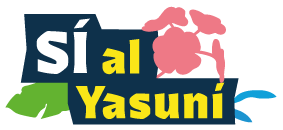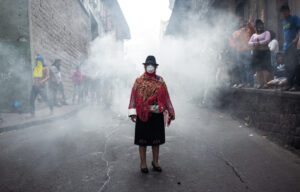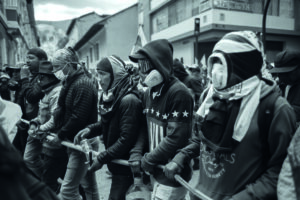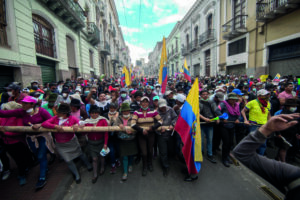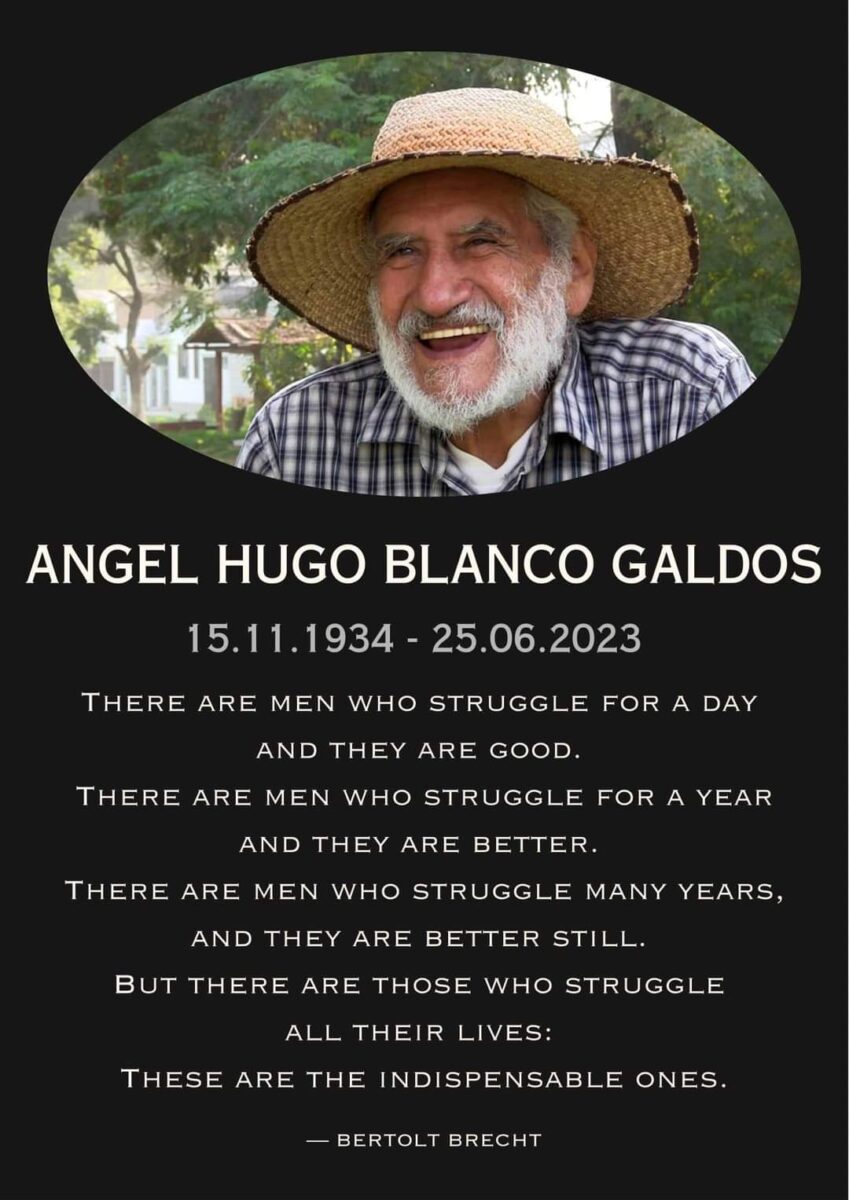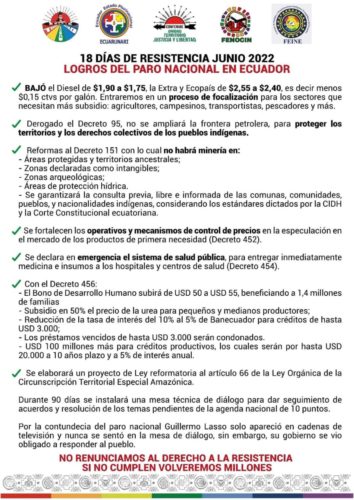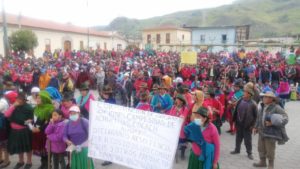***LATEST *** Thanks to the tremendous victory of the indigenous struggle in Ecuador in the agreement of 30 June, this petition is no longer being promoted. Full details here: https://www.ecosocialist.scot/?p=1340 We thank those who supported it and will keep them informed of developments. The article and updates will remain on our website as a historic record and background of the struggle.
ecosocialist.scot is launching a global petition (below) against the current repression in Ecuador and in solidarity with the movement of the indigenous people, other workers organisations and social movements for just demands in their general strike against the right wing government of President Lasso. Early signatories include parliamentarians, political and climate activists, and workers’ leaders from across the world.
The general strike in Ecuador was initially called by the movement of indigenous people (CONAIE) and has been underway since Monday 13 June. The strike and mass protests are growing in support among workers, but have been met by a massive wave of repression by the Lasso government including the illegal detention of indigenous leader Leonidas Iza, mass arrests and police brutality including the killing of an 18 year old indigenous protestor and at least four others (see below for Latest News and https://www.ecosocialist.scot/?p=1277 for background).
We are targeting this petition at both the workers movement and the climate justice movement. The 10 demands of the movement relate not just to the harsh economic conditions of the people through rising prices of food and fuel while workers’ incomes fall, but are also against the exploitation of the natural environment and extraction of resources that has devastated indigenous people’s across Ecuador, the entire continent and the world. The demands include opposition to privatisation of public services and the need for investment in education and health.
The petition can be found on the ipetitions website (link below) and can also be signed on a Google form. ipetitions will display the total global signatories, but if you also fill in the form to share your details we’ll be able to publicise your designation and area of activity. The list below will therefore extend. We call on all activists in the workers and climate justice movement to both sign and promote the petition on social media and through your organisations. The world needs to support the movement of indigenous peoples, workers and environmental activists in Ecuador in their hour of need.
LATEST EVENTS from our correspondents on the ground – updated 25 June 2022
The Ecuador National Assembly is debating online a motion of no confidence in President Lasso though it seems doubtful that it will be passed. President Lasso has suspended the State of Emergency order, in a blatant attempt to try to void the no confidence motion. But the repression against demonstrators continues, as show in videos below. Many thousands more indigenous protestors have mobilised to reinforce those already in the capital, Quito.
Police brutality against protesters in Quito on Friday.
Indigenous communities in Chimboraza in the central highlands send reinforcements to the protests in capital Quito
Indigenous communities in Chimboraza in the central highlands send reinforcements to the protests in capital Quito (Facebook video)
Thursday 23 June report
Thursday, the eleventh day of the national strike in Ecuador, was a very intense day. It began with an important victory for the indigenous-led movement. Thousands of mainly indigenous protesters managed to reoccupy, entirely peacefully, the main cultural centre in Quito, the Casa de Cultura. This is where the indigenous movement has traditionally found shelter when it mobilises in the capital. It was their centre of operations during the uprising of October 2019. However, as part of its state of emergency, the government had sent the army and police to seal off the building and its grounds. This made it much more difficult this time for the indigenous contingents arriving in Quito to find shelter and have a coordinated logistical and symbolic centre. They had been more spread out around various university campuses that had partially allowed them in. Some were left sleeping out in the cold.
The fact that on Thursday, faced with a huge swell of protesters outside, the security forces simply let them in, was interpreted as a possible, significant concession by the government. A massive and euphoric rally of indigenous and other protesters took place in the main auditorium, addressed, in particular, by Leonidas Iza, the undisputed, central leader of the strike. There was talk of more concessions and the possibility of meaningful talks, with results, as the movement has been putting it, with the government.
However, a little later, part of the movement, led by indigenous women, began to march from the House of Culture to the National Assembly, to put pressure on them. There have been so-far unsuccessful attempts there to revoke the president’s decrees of a state of emergency. This march was met with very severe repression from the police and army, using tear gas, water cannon and live, buckshot, ammunition. At least one young man died after receiving multiple pellet shots in his chest and neck. As night fell, groups of police on motorbikes also attacked at least one of the humanitarian locations where people from the local community were distributing food to indingenous protesters. In one case the police fired pistols at the group as they ate, wounding at least one of them. There are reports of another death as well, taking the total so far to at least four.
Another worrying development is that sections of the middle-class, racist right in Quito have begun to mobilise against the protests. There are reports of groups of white-shirted young man driving around and abusing isolated individuals or vulnerable groups of indigenous protesters, shouting racist abuse at the “f****** indians” and telling them to go home. It is not clear if there have been physical attacks, but some of these vigilantes seem to be carrying guns. The right also mobilised a march of a few thousand towards the area where the protesters are concentrated, but they didn’t get very far and soon turned back to their base in the affluent neighbourhoods of north-central Quito.
Thank you for your support.
ecosocialist.scot
______________________________
Text of petition and signatories (English/Spanish)
Stop the repression in Ecuador, Solidarity with the Indigenous-led strike! / Alto a la represión en Ecuador, Solidaridad con el paro Indígena
To also have your name publicly associated with this petition, please complete the form here: https://forms.gle/jFzJ5T7a4VTDa2VL9 This petition was initially organised by ecosocialist.scot / Para que su nombre también se asocie públicamente con esta petición, complete el formulario aquí: https://forms.gle/jFzJ5T7a4VTDa2VL9 Esta petición fue organizada inicialmente por ecosocialist.scot
STOP THE REPRESSION IN ECUADOR, SOLIDARITY WITH THE INDIGENOUS-LED STRIKE!
“The repression against the nationwide strike called by the indigenous movement in Ecuador has only increased since President Guillermo Lasso first declared a state of emergency and a curfew on Friday, 17 June. The police and army have been using brutal force, tear gas, stun grenades, pellet shot, to stop thousands of peaceful indigenous protesters from entering the capital, Quito. At least one protester has died, three are reported to be in a critical condition, dozens more have been wounded or arrested. The army and police have sealed off the House of Culture and several university campuses in an attempt to deny the indigenous protesters their traditional places of shelter in the capital. An immense citizen effort is underway, from students, women’s groups, neighbourhood organisations and the population in general, to collect food, blankets and basic provisions for the protesters who have made it into Quito.
Massive mobilisations and road blocks continue in indigenous territories across Ecuador. The local Governor’s offices have been occupied in at least three provinces.
Secondary school and university students, teachers, health workers, trade unionists, neighbourhood organisations and the feminist movement are mobilising in towns and cities.
Bus drivers, taxi drivers and truckers have either promised stoppages or already joined in the road blocks.
We the undersigned, demand an immediate end to the violent repression of peaceful protesters in Ecuador. We call on President Lasso and the government of Ecuador to lift the state of emergency, release those still in detention and drop all charges against the movement’s best known leader, Leonidas Iza, President of Conaie, who was illegally detained on 14 June and released 24 hours later, but who still faces charges that carry a possible prison sentence of 1-3 years.
In place of a military response, we urge President Lasso to engage in serious negotiations with the indigenous movement and other social movements, to address their just demands.
These include the 10 points put forward by Conaie – including fair prices for agricultural products; freezing of fuel prices because this generates price increases; respect for the collective rights of indigenous peoples and nationalities; a budget for health and education; an end to the voracious extractivism in indigenous territories; stop speculation and rising prices of basic food basket items; stop the privatisation of strategic sectors; public policies to curb the wave of violence.
These have since been enriched by other social movements incorporating their own demands, for example for public polices to curb gender violence and femicide.
The victory of Gustavo Petro and Francia Marquez in the presidential elections in neighbouring Colombia, show that the people of the region want to turn the page on decades of neoliberal economic policies that only generate poverty, violence, racial exclusion and the destruction of mother earth. We stand in solidarity with all their struggles and with the indigenous-led strike in Ecuador.”
ALTO A LA REPRESIÓN EN ECUADOR, SOLIDARIDAD CON EL PARO INDÍGENA
“La represión contra el paro nacional convocado por el movimiento indígena en Ecuador no ha hecho más que aumentar desde que el presidente Guillermo Lasso declaró el estado de excepción y el toque de queda el viernes 17 de junio. La policía y el ejército han utilizado una fuerza brutal, gases lacrimógenos, granadas de aturdimiento y perdigones, para impedir que miles de manifestantes indígenas pacíficos entren en la capital, Quito. Al menos un manifestante ha muerto, tres se encuentran en estado crítico y docenas más han sido heridos o detenidos. El ejército y la policía han acordonado la Casa de la Cultura y varios campus universitarios en un intento de negar a los manifestantes indígenas sus lugares tradicionales de refugio en la capital. Está en marcha un inmenso esfuerzo ciudadano, por parte de estudiantes, grupos de mujeres, organizaciones vecinales y la población en general, para recoger alimentos, mantas y provisiones básicas para los manifestantes que han conseguido entrar en Quito.
Continúan las movilizaciones masivas y los bloqueos de carreteras en los territorios indígenas de todo Ecuador. Las gobernaciones locales han sido ocupadas en al menos tres provincias.
Estudiantes de secundaria y universitarios, profesores, personal sanitario, sindicalistas, organizaciones vecinales y el movimiento feminista se movilizan en pueblos y ciudades.
Los conductores de autobuses, taxistas y camioneros han prometido paros o ya se han sumado a los cortes de carretera.
Nosotros, los abajo firmantes, exigimos el cese inmediato de la represión violenta de los manifestantes pacíficos en Ecuador. Pedimos al presidente Lasso y al gobierno de Ecuador que levanten el estado de excepción, liberen a los que aún están detenidos y retiren todos los cargos contra el líder más conocido del movimiento, Leonidas Iza, presidente de la Conaie, que fue detenido ilegalmente el 14 de junio y liberado 24 horas después, pero que aún se enfrenta a cargos que conllevan una posible condena de prisión de 1 a 3 años.
En lugar de una respuesta militar, instamos al presidente Lasso a entablar negociaciones serias con el movimiento indígena y otros movimientos sociales, para atender sus justas demandas.
Entre ellas se encuentran los 10 puntos planteados por la Conaie, entre ellos, precios justos para los productos agropecuarios; congelación de los precios de los combustibles porque esto genera aumentos de precios; respeto a los derechos colectivos de los pueblos y nacionalidades indígenas; presupuesto para la salud y la educación; fin del extractivismo voraz en los territorios indígenas; freno a la especulación y al aumento de los precios de los productos de la canasta básica; freno a la privatización de los sectores estratégicos; políticas públicas para frenar la ola de violencia.
Desde entonces se han enriquecido con otros movimientos sociales que han incorporado sus propias demandas, por ejemplo, políticas públicas para frenar la violencia de género y el feminicidio.
La victoria de Gustavo Petro y Francia Márquez en las elecciones presidenciales de la vecina Colombia, demuestran que los pueblos de la región quieren darle vuelta a la página de décadas de políticas económicas neoliberales que sólo generan pobreza, violencia, exclusión racial y destrucción de la madre tierra. Nos solidarizamos con todas sus luchas y con la huelga liderada por los indígenas en Ecuador”.
Initial list of Signatories (22 June 2022/22 junio 2022)
Miguel Urbán, Member of European Parliament/Eurodiputado, Anticapitalistas (Spanish State/Estado Español)
Martín Mosquera (Argentina)
Senador Rafael Bernabe (Puerto Rico)
Luis Bonilla. Otras Voces en Educación (Venezuela)
Olmedo Beluche por el Polo Ciudadano (Panamá)
Josefina Chávez (México)
Eduardo Lucita , EDI, (Argentina)
Eric Toussaint, Portavoz de CADTM (Belgium/Bélgica)
Edgard Sánchez (México)
Manuel Rodríguez Banchs. Democracia Socialista (Puerto Rico)
Joao Machado Borges Neto (Brazil/Brasil)
Tárzia Maria de Medeiros (Brazil/Brasil)
Stalin Pérez Borges. LUCHAS (Venezuela)
Ana Cristina Carvalhaes Machado (Brazil/Brasil)
Fernanda Melchionna, diputada federal/PSOL Rio Grande do Sul (Brazil/Brasil)
Sâmia Bomfim, diputado federal/PSOL São Paulo (Brazil/Brasil)
Vivi Reis, diputada federal/ PSOL Pará (Brazil/Brasil)
Luciana Genro, diputada estadual/ PSOL Rio Grande do Sul (Brazil/Brasil)
Roberto Robain, dirigente del MES/PSOL /concejal de Porto Alegre (Brazil/Brasil)
Israel Dutra, Secretario general del PSOL (Brazil/Brasil)
Pedro Fuentes, dirigente del MES/PSOL (Brazil/Brasil)
Bruno Magalhaes, dirigente del MES/PSOL (Brazil/Brasil)
Philippe Pierre-Charles Groupe Révolution Socialiste (Martinique/Martinica)
Daniel Libreros. Movimiento Ecosocialista (Colombia)
Franck Gaudichaud France Amérique Latine (France/Francia)
Béatrice Whitaker (France/Francia)
Pierre Rousset, NPA, (France/Francia)
Richard Neuville, ENSEMBLE (France/Francia)
Renato Roseno, diputado de Ceará/PSOL (Brazil/Brasil)
Mario Barreto, presidente de PSOL Río de Janeiro (Brazil/Brasil)
Nadja Carvalho, Isabel Lessa y Fernando Silva del Directorio Nacional del PSOL (Brazil/Brasil)
Mike Picken, ecosocialist.scot (Scotland/Escosia – UK)
Iain Gault, ecosocialist.scot (Scotland/Escosia – UK)
Terry Conway, Anti*Capitalist Resistance (England/Inglaterra – UK)
Iain Bruce, journalist/periodista (Scotland/Escosia – UK)
Frances Curran, Former member of Scottish Parliament/Socialists for Independence (Scotland/Escosia – UK)
Jim Bollan, Councillor – West Dunbartonshire, (Scotland/Escosia – UK)
Stephen Smellie, Unison Scotland (personal capacity) (Scotland/Escosia – UK)
John Rees, socialist activist (England/Inglaterra – UK)
Barry Sheppard (USA)
Jeff Mackler, National Secretary Socialist Action (USA)
Mónica Baltodano, Integrante de la Articulación de Movimientos Sociales (Nicaragua)
Oly Millán, Integrante de la Plataforma Ciudadana en Defensa de la Constitución (Venezuela)
Tarcísio Mota, Chico Alencar, Monica Benício y William Siri, councillors/concejales/as de Rio de Janeiro (Brazil/Brasil)
Mônica Francisco, State Deputy /diputada de estado Rio de Janeiro (Brazil/Brasil)
Orlando Barrante, Movimiento de Trabajadores y camponeses – MTC (Costa Rica)
Luana Alves, City Councillor/Vereadora São Paulo, Executiva nacional do PSOL (Brazil/Brasil)
Humberto Meza, Comite Brasileño de Solidaridad con Nicaragua (Brazil/Brasil)
Fernando Carneir, city councillor/ vereador Belém-Pa PSOL (Brazil/Brasil)
Aurelio Robles, Coordinador del Movimiento Alternativa Socialista-MAS (Panamá).
Mariana Riscali, Nat Sec Finance/Secretária Nacional de Finanças do PSOL (Brazil/Brasil)
Monica Seixas, deputada estadual São Paulo (Brazil/Brasil)
Mariana Conti – City Councillor/Vereadora Campinas, São Paulo (Brazil/Brasil)
Fábio Felix, Dep. Distrital Brasília (Brazil/Brasil)
Josemar, City Councillor/Vereador São Gonçalo RJ (Brazil/Brasil)
Pedro Ruas, City Councillor/Vereador Porto Alegre RS (Brazil/Brasil)
Jurandir Silva, City Councillor/Vereador Pelotas RS (Brazil/Brasil)
